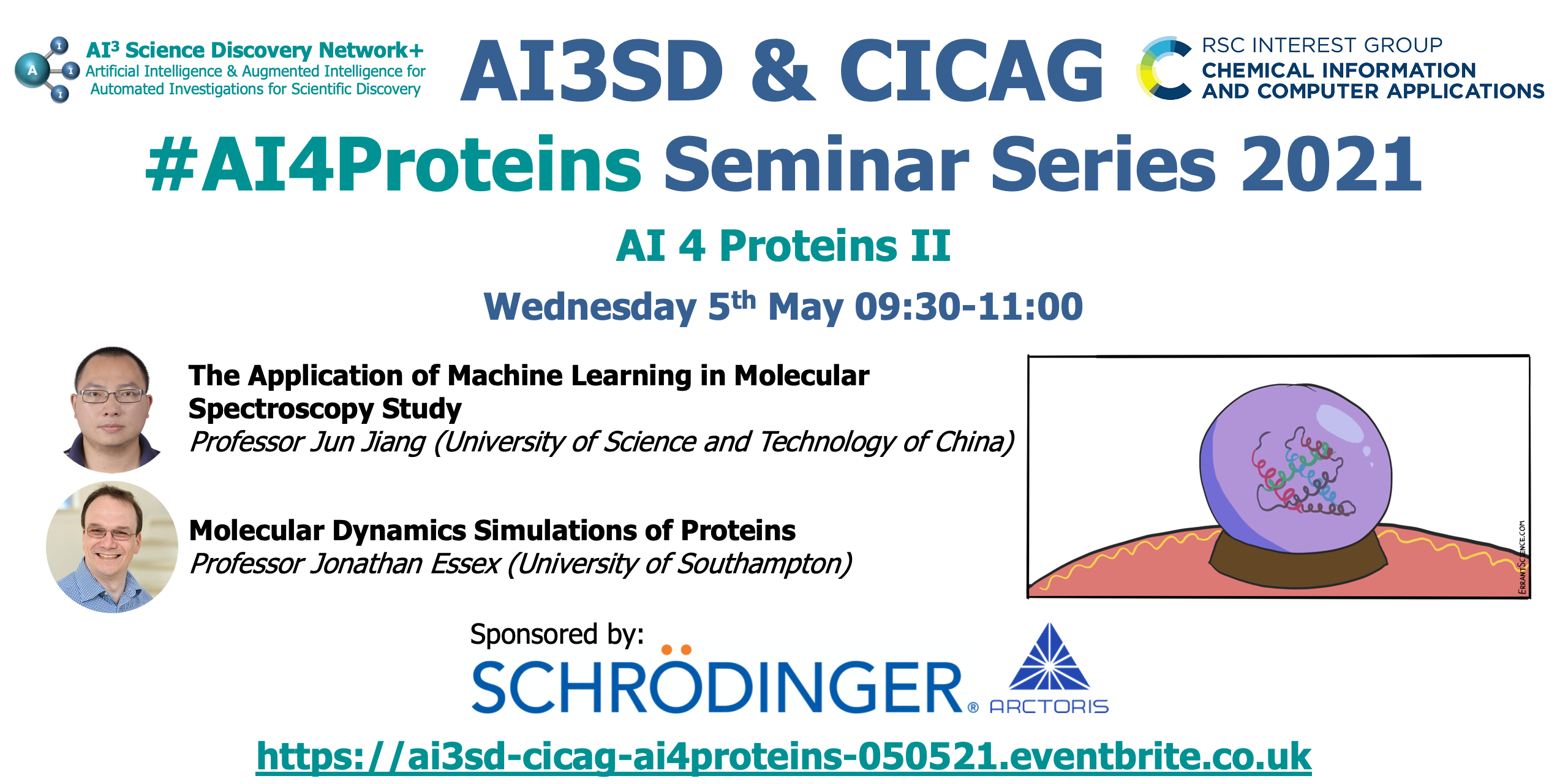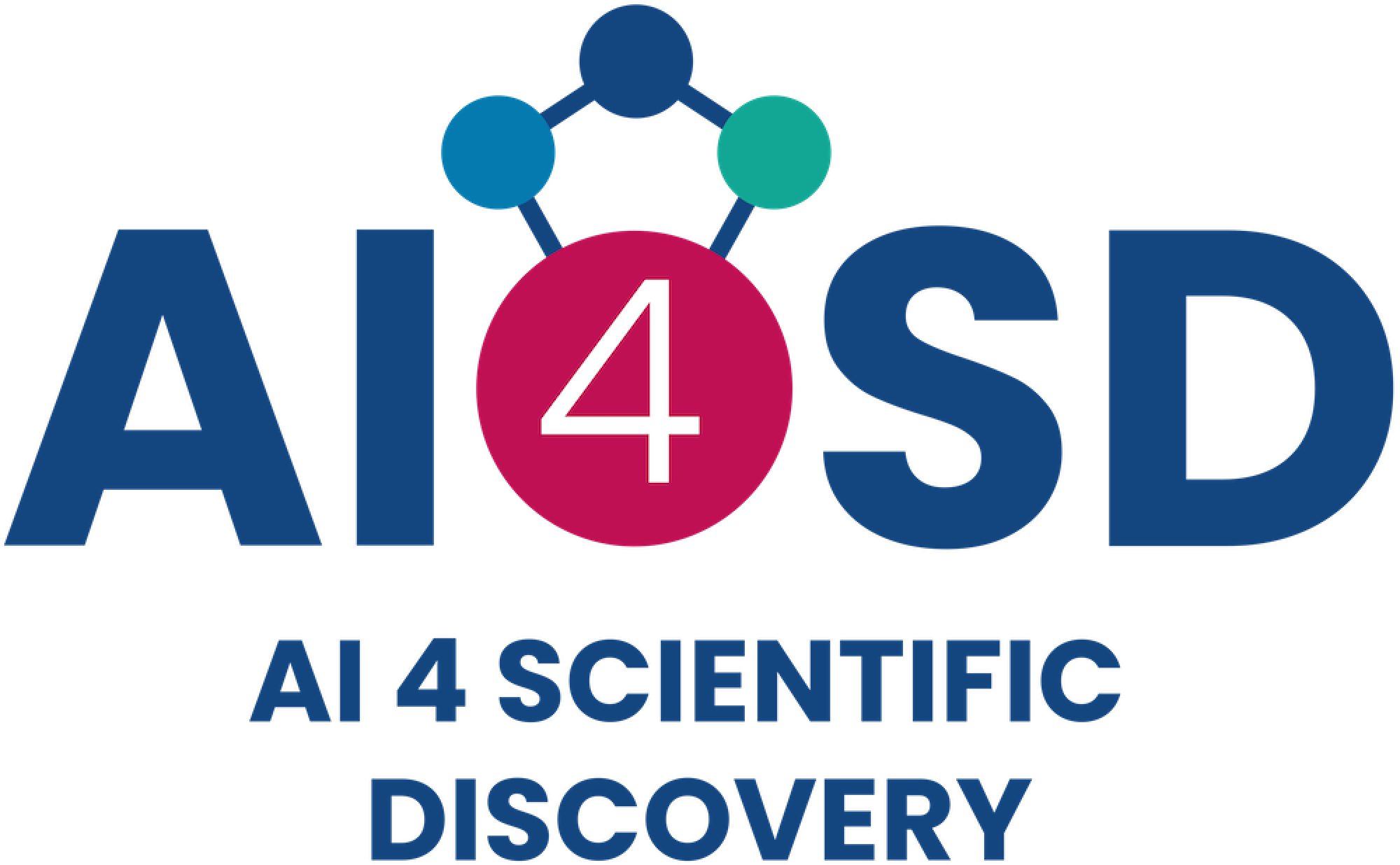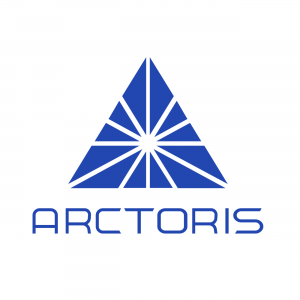
- This event has passed.
05/05/2021 – AI3SD & RSC-CICAG AI 4 Proteins II
5th May 2021 @ 9:30 am - 11:00 am
Free
Eventbrite Link: https://ai3sd-cicag-ai4proteins-050521.eventbrite.co.uk
Description:
This seminar forms part of the AI3SD/RSC-CICAG AI 4 Proteins Seminar Series. This seminar will be run via zoom, when you register on Eventbrite you will receive a zoom registration email alongside your standard Eventbrite registration email. Where speakers have given permission to be recorded, their talks will be made available on our AI3SD YouTube Channel.
Agenda
- 09:30-10:15: The Application of Machine Learning in Molecular Spectroscopy Study – Professor Jun Jiang (University of Science and Technology of China)
- 10:15-11:00: Molecular Dynamics Simulations of Proteins – Professor Jonathan Essex (University of Southampton)
Abstracts & Speaker Bios
- The Application of Machine Learning in Molecular Spectroscopy Study – Professor Jun Jiang: Optical-spectroscopy provides powerful toolkits to decipher molecular structures and their configuration evolutions. However, the theoretical analysis of spectroscopic signals and connecting them with structural detail is a challenging task. Moreover, the intrinsic complexity of spectroscopic signals of molecular systems makes it difficult to correlate spectral characteristics with the underlying molecular structure and dynamics. Herein, we have developed data-driven machine learning (ML) protocols that can predict infrared (IR), ultraviolet/visible (UV/Vis) and Raman spectra of molecule systems with 3 to 5 orders of magnitude reduced computation cost compared to direct quantum chemistry calculations. A convolutional neural network (CNN) model was trained and tested on a dataset consisting 87993 spectra computed from protein peptide segments with α-helical, β-sheet, and other typical secondary structures. The secondary structure classification accuracy reached near 100% and over 98.7% on spectra sets of new segments extracted from the same and homologous proteins, respectively. Importantly, we demonstrate the ML protocol to realize cost-effective relations between spectra, structure, and chemical properties, i.e. spectra determination/prediction from structural information, and configuration or chemical properties determination/recognition from spectroscopic signals.
1. S. Ye, K. Zhong, J.X. Zhang, W. Hu, J. Hirst, G.Z. Zhang, S. Mukamel, J. Jiang*, A Machine Learning Protocol for Predicting Protein Infrared Spectra, J. Am. Chem. Soc. 142 (2020) 19071-19077.
2. X.J. Wang, S. Ye, W. Hu, E. Sharman, R. Liu, Y. Liu, Y. Luo, J. Jiang*, Electric Dipole Descriptor for Machine Learning Prediction of Catalyst Surface-Molecular Adsorbate Interactions, J. Am. Chem. Soc. 142 (2020) 7737-7743.
3. S. Ye, W. Hu, X. Li, J.X. Zhang, K. Zhong, G.Z. Zhang, Y. Luo, S. Mukamel*, J. Jiang*, A Neural Network Protocol for Electronic excitations of N-Methylacetamide, Proc Natl Acad Sci USA. 116 (2019) 11612-11617.
4. W. Hu, S. Ye, Y.J Zhang, T.D. Li, G.Z. Zhang, Y. Luo, S. Mukamel, J. Jiang*, Machine Learning Protocol for Surface-Enhanced Raman Spectroscopy, J. Phys. Chem. Lett. 10 (2019) 6026-6031.
Bio: Jun Jiang is a professor at Hefei National Laboratory for Physical Sciences at the Microscale, University of Science and Technology of China (USTC). He received a B.S. degree in Theoretical Physics in 2000 at WuHan University, China, a Ph.D. degree in Theoretical Chemistry under the tutelage of Prof. Yi Luo in 2007 at Royal Institute of Technology, Sweden, a Ph.D. degree in Solid State Physics under the tutelage of Prof. Wei Lu in 2008 at Shanghai Institute of Technical Physics, Chinese Academy of Science. From 2008 to 2011, he worked as Post-doc at Royal Institute of Technology, Sweden and University of California Irvine under the tutelage of Prof. Shaul Mukamel. He joined the University of Science and Technology of China in December, 2011 as a Professor in Physical Chemistry. Dr. Jiang’s research interests focus on the development and employment of multi-scale modeling methods and Machine learning techniques, for simulating Charge kinetics in complex system. He targets on a wide range of physics or chemistry applications such as Photocatalysis, Biochemistry, Photochemistry, Molecular electronics and photonics. He has published more than 50 papers in prestigious journals such as Nature Energy, J. Am. Chem. Soc., Angew. Chem. Int. Ed. Dr. Jiang is a recipient of the “National Science Fund for Distinguished Young Scholars in China”, and has won the “Young Theoretical Chemistry Investigator Award of Chinese Chemistry Society”, “Distinguished Lectureship Award of the Chemical Society of Japan 2020”. - Molecular Dynamics Simulations of Proteins – Professor Jonathan Essex: Molecular dynamics simulations are now widely used to explore protein structure and function. These simulations are underpinned by physical models of the interactions between the system components, and Newtonian dynamics to capture flexibility and entropic effects. However, the simulations still require choices to be made regarding the structures used, and are hampered by simulation lengths that are still, despite advances in computing technology, significantly shorter than experimental timescales. In this presentation, the consequences of these choices will be explored in the context of calculating protein-ligand binding affinities. In particular, the influence of the initial protein crystal structure, histidine rotamer and tautomer states, and water locations on protein-ligand binding free energies will be presented. The implications of these results for machine learning approaches to model protein systems will be discussed.
Bio: Jonathan Essex was an undergraduate at Oriel College, Oxford, and graduated with a first class honours degree in Chemistry in 1989. He then studied for a D.Phil. in computational modelling under the supervision of Prof W.G. Richards at the same institution. During his postgraduate degree he was supported by a Glaxo Research Scholarship. Having obtained his D.Phil. in 1992, he took up an SERC/NATO Postdoctoral Fellowship in the group of Prof W.L. Jorgensen at Yale University. In 1994 he returned to the UK to the University of Southampton as a Royal Society University Research Fellow. He was appointed Lecturer in 1997, Senior Lecturer in 2001, Reader in 2005 and to a Personal Chair in 2007. Jon was awarded the 2002 Marlow Medal from the Royal Society of Chemistry for his work in the development of techniques and application of molecular simulations to the study of proteins and related systems of biological importance. He was awarded a Royal Society Wolfson Research Merit Award in 2013. He is an Editorial Board member of the Journal of Computer Aided Molecular Design and an editorial advisor for BMC Chemistry. In addition, he serves on the Advisory Board of CCPBioSim, a collaborative chemistry project dedicated to biomolecular computer simulations, is a member of the EPSRC college, and has served on the Project Working Group for the procurement of HECToR, the UK’s next generation supercomputer.

